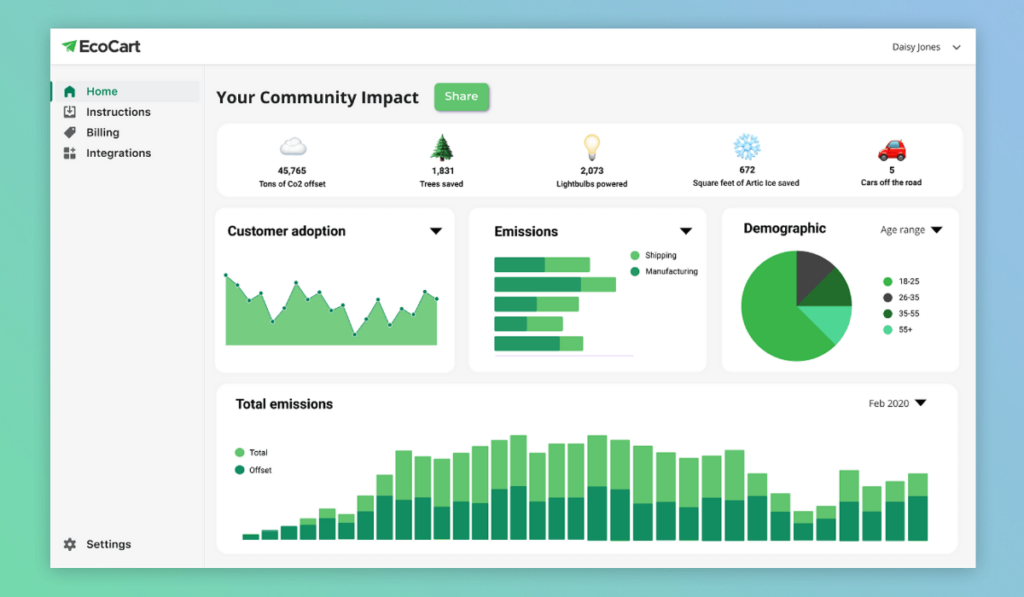As you work hard to ensure your company achieves its ESG goals, you can’t forget supply chain sustainability. Your suppliers are an extension of your company and if your suppliers aren’t sustainable, then your company isn’t either.
So, what is a sustainable supply chain, and how can a supply chain be sustainable? Here’s our guide.
What Is Supply Chain Sustainability?
Supply chain sustainability refers to the environmental impact and social responsibility of a company’s supply chain operations. A large portion of any company’s environmental and social impact comes from its suppliers.
Companies that are serious about their ESG goals must consider supply chain sustainability.
While this at first seems simple, in reality, sustainable supply chain management poses a difficult task, and it remains a top challenge for companies big and small. However, the challenge is worth it, as responsible supply chains can help elevate your brand above the competition and ensure that your company reaches its sustainability KPIs.
Why Is Sustainability Important In The Supply Chain?
Supply chain sustainability is essential to remaining compliant with many green business certifications or ESG certifications, improving brand reputation, and avoiding risks. For example, between June 2022 and April 2023, U.S. Customs and Border Protection seized almost $1 billion in goods produced from forced labor. Many of the companies whose products were held were unaware that their products were tainted. Even so, under the Uyghur Forced Labor Prevention Act, these companies faced fines for importing such goods, in addition to suffering financial losses due to the confiscation of their merchandise.
This is just one example of how important it is that companies rigorously vet their supply chains for environmental and social responsibility. The Uyghur Forced Labor Prevention Act isn’t the only law that places the burden of responsibility on companies when it comes to their supply chains. The EU’s proposed Corporate Sustainability Due Diligence Directive (CSDD) requires companies that operate in the EU to create a sustainable supply chain or face fines.
Compliance is just one of many reasons to invest in a sustainable supply chain. The majority of any company’s environmental footprint comes from its suppliers, so if your ecommerce business has net zero goals, it must have strategies in place for its suppliers, too.
Additionally, customers demand that the companies they support pay attention to where their products and materials come from. Responsible supply chain management is both the right thing to do and a prudent business decision.
Supply Chain Sustainability Statistics
You don’t have to take our word for it. Plenty of studies and statistics prove that sustainable supply chains are good for the environment and business. Not only are customers willing to pay more for products that come from transparent supply chains, but companies that have invested in supply chain sustainability have earned much higher profits than companies that don’t.

- Customers are willing to pay 2 – 10% more for products displaying supply chain transparency. (Harvard Business Review)
- A company’s suppliers can be responsible for up to 80% of its carbon emissions and 90% of its air, land, water, biodiversity, and resource impact. (McKinsey)
- Seventy-nine percent of companies investing in a sustainable supply chain see revenue growth well above average. (Deloitte)
- The supply chain management industry is growing rapidly, highlighting its importance. In 2020, it was valued at $15.85 billion, and it’s expected to grow to $31 billion by 2026. (GlobeNewswire)
- Forty-eight percent of companies feel increased pressure to make their supply chains more sustainable. (MHI)
Benefits Of A Sustainable Supply Chain
The biggest benefits of supply chain sustainability are twofold: risk mitigation associated with compliance and resource use and improved reputation amongst your customers. In the past, supply chain sustainability efforts were simply a good idea to place a company above its competition. Now, it’s an essential part of modern business that companies must prioritize to avoid legal and social repercussions.
Here are some of the biggest advantages of pioneering supply chain sustainability initiatives within your company:
- Reduced environmental footprint: More than 90% of a company’s environmental footprint comes from its supply chains. If you’re not engaging your suppliers in your sustainability journey, you are not taking accountability for the majority of your footprint.
- Risk management: Diversification of suppliers and sourcing from environmentally and socially stable regions minimizes financial risk. In fact, studies show that sustainability performance reduces the risk of bankruptcy by a significant amount.
- Improved brand reputation: This study found that 77% of customers consider sustainability important when making purchasing decisions. It’s not enough that your company claims sustainability. You must show that your products are sourced sustainably, too.
- Regulatory compliance: As mentioned above, multiple new and proposed laws across the globe place the burden of responsibility on the shoulders of companies to ensure that their supply chains are socially and environmentally responsible. Failure to do so could result in fines.
- Supply chain transparency: When companies demand that they have sustainable supply chains, it encourages supply chain transparency. This is incredibly important, especially considering that supply chains can become complicated, and often, companies and individuals make use of tainted supply chains without realizing it.
- It’s the right thing to do: When it comes down to it, we should support ethical suppliers and promote responsible sourcing. Besides the cost savings and improved brand reputation, we shouldn’t forget that supporting suppliers that are operating responsibly is simply what we should be doing.
Ways To Improve Supply Chain Sustainability
To reach your supply chain sustainability goals, you must engage your suppliers so that you can perform a comprehensive assessment of their operations, addressing all three facets of ESG performance.
Once you’ve called attention to areas that can be better, you can work with your suppliers to develop sustainability initiatives so that they can conduct more sustainable business practices. These can include things like switching to eco-friendly packaging, sustainable inventory management, transitioning to renewable energy sources, providing diversity training, and more.
Here are some of the biggest ways that you can improve your supply chain sustainability.
- Conduct comprehensive supply chain assessments. Read our guide to conducting a supply chain audit to get an idea where your business stands.
- Collaborate with suppliers on shared sustainability goals.
- Utilize technology for enhanced transparency and traceability.
- Embrace circular economy principles to reduce waste.
- Invest in renewable energy sources and energy-efficient sustainable practices.
- Support fair labor practices and ethical sourcing.
- Conduct regular audits to ensure you and your suppliers are on track to achieve a sustainable supply chain.
Want to know where your business stands? Get your sustainability scorecard with our quiz:
Challenges Of Supply Chain Sustainability
Unfortunately, supply chain sustainability efforts and decarbonizing your supply chain come with a myriad of challenges. Key among them is the need for more transparency along supply chains. Often, suppliers have their own suppliers who have their own suppliers, which makes it impossible to have control over where and how your products and materials are sourced.
Another big challenge, especially for medium or small businesses, is finances. Conducting thorough supply chain audits and investing in more sustainable supply chains can be a major burden to companies with fewer resources than their big counterparts. This can deter smaller companies from investing in supply chain sustainability.
However, it’s important to remember that the budget you put into sustainable operations can be far less than the potential cost of using unsustainable suppliers, both from regulatory fines and loss of customers. The good news is that you don’t have to pursue sustainable ecommerce alone. EcoCart offers plenty of resources to help companies like yours reach their carbon emissions goals. Our emissions dashboard, for example, can help you track your carbon footprint so that you can see where your sustainability initiatives are working and where you might improve.

Supply Chain Sustainability Best Practices
The keys to responsible supply chain management are transparency, engagement, and comprehensive approaches. Your suppliers must be willing to work with you to achieve higher sustainability goals, and you need to ensure that you cover both environmental and social responsibility; within sustainability, human rights are held in equal regard to eco-friendly practices.
To ensure that you are comprehensive in your supply chain strategies, here are some of the best sustainable practices to consider.
- Supply chain engagement: Supply chain professionals must be involved in your sustainable supply chain management strategies. Your suppliers need to be willing to undergo comprehensive audits and implement strategies to become more sustainable. If they are reluctant to engage, you may need to switch to a supplier who will assist you in your sustainability endeavors.
- Long-term goals: When developing sustainable supply chain practices, it must include long-term goals for the future. Think about changes you can make now that will allow you to hit large, impactful goals in the future.
- Don’t forget about the social and governance: Sustainability isn’t just about environmental responsibility. Your suppliers must display high levels of social responsibility and proper governance to be considered sustainable. As you work with your supply chain professionals, don’t forget to analyze things such as fair trade, workers’ rights, diversity in the workplace, and similar.
- Keep your supply chains short: Supply chain transparency is one of the greatest challenges of sustainability. One of the best ways to ensure transparency is by keeping your supply chains as short as possible. Traceability of supply chain operations is far easier when you have few suppliers between materials sourcing and product manufacturing.
- Circular economy principles: To ensure the least waste associated with your products, you should employ circular economy principles along your sustainable supply chains. These include avoiding virgin materials as much as possible, offering recycling receptacles in your facilities, and switching to recyclable packaging.
- Compliance: We’re not just talking about complying with current regulations. Practice some foresight and develop strategies that ensure you and your suppliers comply with future laws and regulations, too.
Conclusion
Having a sustainable supply chain is imperative in modern business. If it’s not already, your company needs to start investing in strategies to ensure that its suppliers are aligned with your company’s sustainability goals. Otherwise, your sustainability initiatives will only go so far.
EcoCart is here to help you achieve your sustainability goals surrounding your carbon footprint. With resources like carbon-neutral shipping, carbon offset programs, an emissions dashboard, and more, we’ve got the tools you need so that you and your suppliers can be as green as possible. If you’re interested in learning more, reach out to our team for a demo today.



